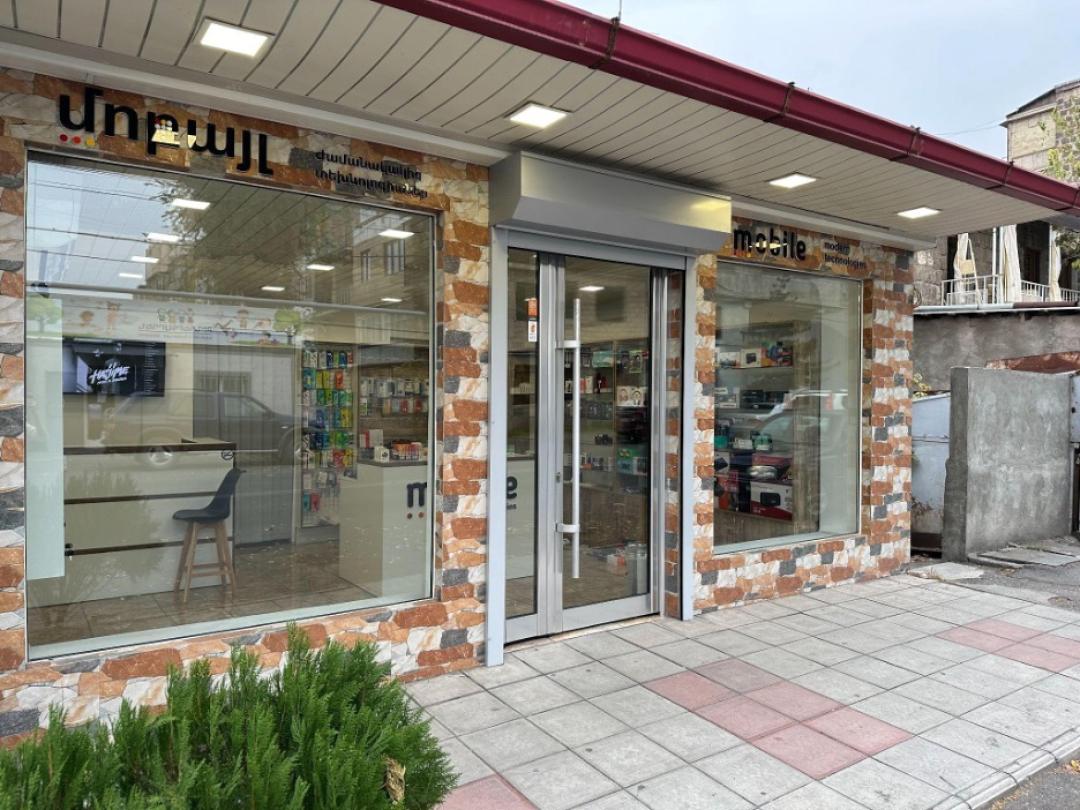
Building a New Beginning: Struggles and Triumphs of Armenians from Nagorno-Karabakh

24-year-old brothers Gagik and Tigran have been displaced from Nagorno-Karabakh to Armenia for about four months. It has been three months since the brothers started their first business in Yerevan's Shengavit Community: they opened an electronics store."Getting a job in Yerevan is more difficult than in Karabakh. We couldn't find a job and decided to open our own; let's try and see what will happen. It is simply impossible without a job here, especially since there is no house; we rent it," says Gagik Ulubabyan.
The boys and three other family members had to leave their lives and homes like thousands of Armenians in Nagorno-Karabakh at the end of September. They were only able to bring clothes from home to Stepanakert [Khankendi]; everything they acquired as a result of a lifetime's work remained there."We did not start from 0, but from minus. We have to do a lot of work to get to level 0, and then try to move forward," says Gagik.
Like thousands of other Nagorno-Karabakh Aremenians, the Ulubabyans faced the problem of finding accommodation when they moved to Yerevan. "When we first arrived, we found a single-room house for rent and were living there with the whole family. Recently, we found a relatively more suitable apartment; at least there are two bedrooms".
The house is relatively comfortable, but the rent is even more expensive. Despite lacking entrepreneurial experience, the pressing social issues compelled the two brothers to take prompt action. Gagik worked in an electronics store in Stepanakert, and he and his brother decided to take a risk and establish a similar store in Yerevan. Even the name was identical: Mobile modern technologies.
"In the beginning, it was very difficult because everything is different from Karabakh, also in terms of taxes; what we were used to is not the case here. Registration, paperwork - everything was different, but we did it. Now, although we have no income, there is a perspective," the 24-year-old men say. Although the brothers had been in Yerevan a lot due to work, they say that the rhythm of life is very different.
"Well, Stepanakert was also the capital, but the difference with Yerevan is huge. There was no such rhythm there; it was calm, but here everything is overloaded, it takes a long time to move around the city. Besides, there are many different nations; only Armenians were there. We are not used to such things. Everything is new for us, and it is still difficult," Gagik says frankly, adding that the locals welcomed them very warmly. “We had many acquaintances here, and they were eagerly waiting for us to come and help with something. Everyone helped in whatever way they could.”
Although the new business has helped the Ulubabyans settle more or less in the new place, there are still many social problems. The brothers complain that the Armenian government's state assistance is ineffective, especially for small families.
Which Aid Programs Has the Armenian Government Enacted?
Thus, after the relocation of the Armenian population from Nagorno-Karabakh, Armenia implemented three main programs aimed at their social support. The first one is for meeting primary needs: a one-time 100 000 drams support for each person in the family, regardless of age.
Then, in order to cover the living expenses of the family, a decision was made to provide 40 000 drams per month per person and another 10 000 drams for utility expenses. This program was implemented in October for six months. In November, it was determined to provide two-month social support to each displaced person, 50 000 drams per month. Thus, it turns out that, for example, the rent compensation for a family consisting of two people is 100 000 drams, which is a very small amount for finding an apartment for rent in Yerevan or in the neighboring regions.
At the same time, the government of Armenia allocated more than 4.4 billion drams in recent months to provide food for the displaced persons settled in the regions. In addition, at the end of December, the government of Armenia adopted a decision, taking over 70 percent of the financial obligations of the Nagorno-Karabakh de facto government and residents to Armenian banks. The banks took over the remaining 30% (a total of 315 billion drams in debt).
In January, a new program was introduced to provide employment to displaced persons. The program consists of three components. Within the framework of the first component, a process of professional training for the beneficiary is organized for a period of up to 6 months. In the framework of the second, an employment contract is signed between the employer and the employee for a period of at least 6 months. During the first 3 months, the opportunity to gain work experience is given. In the case of the third component, professional training, work experience, and job placement are planned. The government will finance these programs.
During this period, other states and international organizations, including USAID, the International Red Cross, the European Union, UNHCR, and others, have provided millions of dollars in support. The private sector in Armenia has also tried to contribute to the involvement and employment of displaced people through various programs. As for the most important issue of providing housing, the government has not yet presented a plan in that regard, although they say that it will and options are currently being discussed.
Gagik assures that the issue of housing and work for displaced people is the most important and urgent today. “The apartment rents are so high that you have to have a normal job to make ends meet. You cannot live here with a low salary. If they can offer people a job that earns them normal money, no one will think of going. This is our homeland; we will stay here.”
Although the Armenian government, headed by the Prime Minister, announced that they would encourage displaced Armenians from Nagorno-Karabakh to settle in Armenia and build their lives here, many displaced people still leave the country. Gagik also says that several friends, not finding work in Armenia, left the country, mainly to the Russian Federation.
Statistics
According to the latest data from the Migration and Citizenship Service of the RA Ministry of Internal Affairs, as of January 2024, 115 000 residents displaced from Nagorno-Karabakh were counted. The available official data states that very few displaced people managed to find work. After the Azerbaijani military operation in Nagorno-Karabakh, 1 531 displaced residents were employed in the Armenian state sector, and 7 638 residents of Nagorno-Karabakh have been employed in the private sector since the mentioned period. It is not excluded that some work is done without registration. Many of the displaced residents have settled in rural communities and are engaged in agriculture, for which digital data is not available.
According to the data provided by the National Security Service of Armenia, in the period from September 19, 2023, to February 9, 2024, 12 760 persons registered in Nagorno-Karabakh left Armenia, of whom5 780 returned. It turns out that as of February 9, the number of people who left Armenia and did not return, who have Nagorno-Karabakh records, is 6 980.
Why Do Karabakh Armenians Leave Armenia?
According to former de facto Minister of Labor, Social, and Migration Affairs of Nagorno-Karabakh, Armine Petrosyan, the programs implemented by the Armenian government may have been effective in the initial "burning" period, but currently, they are no longer sufficient."In my opinion, the reason that many people leave Armenia is the program provided by the government, which does not provide sufficient conditions to ensure their stay here. And the residents of Nagorno-Karabakh are trying to find ways out of the situation, and this is already a trend," Petrosyan notes.
The former de facto minister says that they do not expect benefits or similar assistance but support for development, skills improvement, and job security. "To help people create such conditions that they can personally take care of their problems." Petrosyan remembers that there was a similar situation after the 44-day war of 2020, and it was necessary to use that experience and mistakes to act more targeted and effectively this time."I can't say that nothing was done; it was simply possible to approach more effectively so that all target groups benefited from various supports," Petrosyan sums up.
Additionally, most of the problems are related to the issue of citizenship. Following the displacement of Nagorno-Karabakh residents to Armenia, it was made clear that despite the passports they had been issued, they were not automatically recognized as citizens of the Republic of Armenia and were consequently unable to access various rights, such as employment in state institutions. Officially, it was stated that the Armenian population of Nagorno-Karabakh had received Armenian passports for travel purposes, allowing them to freely move in and out of the country without hindrance over the years.
On October 26, 2023, the Armenian government approved a decision to take under its 'temporary protection' the persons staying in Armenia or outside it, whose last address of registration was Nagorno-Karabakh. They were formally recognized as refugees and offered a pathway towards obtaining citizenship within the Republic of Armenia. According to Nagorno-Karabakh lawyer Roman Yeritsyan, out of the 115 000 displaced, only 900 people applied for citizenship. He attributes such a small number of applications to the fact that, in this way, the displaced persons have the opportunity to avoid the obligation of the Armenian military service."After going through all that, many people are not psychologically ready for service. No one can force them to serve, and most of the fear is related to that," says Yeritsyan.
On the other hand, without an Armenian passport, the former Armenian residents of Nagorno-Karabakh cannot work in state institutions or become public servants. "Many people do not apply for citizenship because they are afraid that if they become citizens of the Republic of Armenia, they will be deprived of the compensations allocated to displaced persons. But this is not the case," says the lawyer, noting that in many cases, people are not informed.
Many people want to keep their refugee status. The thing is that Armenia is a member of the Convention on the Status of Refugees. And if a person is recognized as a refugee in the RA, he has the same status in another state that has signed the convention.
"For example, if I can settle in Switzerland, I won't need to apply for refugee status there again; I will be considered a refugee," the lawyer says, adding that in any case, getting an entry visa will become more difficult.
Gagik Ulubabyan also plans to get an RA passport. Now it's difficult because of the queues. "We can't do anything with our passport anymore; we have to change it. It's not like we're giving up our homeland." In the face of huge challenges and uncertainties, Gagik, Tigran, and countless others displaced from Nagorno-Karabakh are resiliently building new lives in Armenia. Their journey is characterized by bravery, tenacity, and unwavering hope for a better tomorrow.
Contributed by Ani Grigoryan






